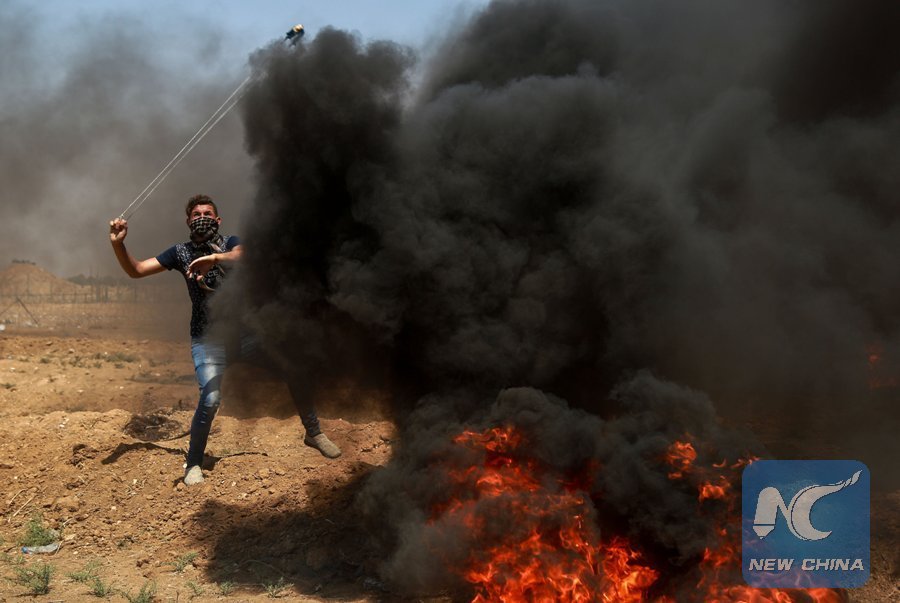
A Palestinian protester uses a slingshot to hurl stones at Israeli troops during clashes, on the Gaza-Israel border, east of Gaza City, on June 8, 2018. (Xinhua/Stringer)
UNITED NATIONS, June 25 (Xinhua) -- The international community should promote sustainable development to alleviate turmoil in the Middle East and North Africa, a Chinese representative said here on Monday.
Wu Haitao, China's deputy permanent representative to the UN, said the international community should stick to dialogue and consultation regarding hotspot issues in the region. Wu was speaking at a UN Security Council debate on the Middle East and North Africa.
The Middle East and North Africa are marked by inter-state conflict, ethnic disputes, war and humanitarian disaster, all of which are intertwined, Wu said.
Regional countries and the international community must accept a common, integrated and sustainable approach to security and find a path to development and prosperity, he said at the day-long debate.
The Israeli-Palestinian conflict is at the core of issues in the Middle East, and China supports a two-state solution and resuming peace talks, he said.
Wu expressed support for the special envoy to the Geneva peace talks on the Syria issue. He called for more support regarding mediation efforts in Yemen, and backed efforts by various parties in Libya for national reconciliation.
On Iran, Wu stressed the need to ensure the implementation of the Joint Comprehensive Program of Action, the nuclear deal reached between Iran and the world powers in 2015, with the United Nations taking the lead mediation role.
Sovereign equality and non-interference in internal affairs was vital, as was respect for each country's will to advance the political process, he said. Regional organizations should promote trust among all parties, while governments should facilitate peace, he added.
An "integrated approach" was needed to address the drivers of conflict, which could all be traced to poverty and under-development, he said, adding that China was ready to strengthen ties with countries in the region under its Belt and Road Initiative.
Convened by Russia, rotating council president for June, the debate saw delegates of the 15-nation body and regional member states reflect on the root causes of the area's conflicts and explore ways to jointly tackle them.
At the debate, UN Secretary-General Antonio Guterres said many fault lines were at work in the region, crossing each other and generating enormous volatility.
Among many flashpoints, he said the Israeli-Palestinian conflict remained central to the Middle East quagmire, with the two-state solution remaining the only viable option -- a view shared by many of the speakers.
He suggested that Middle East and North African countries find platforms akin to the Helsinki process used during the cold war to talk and cooperate.
At the same time, countries in the region must ensure the integrity of the state, governance systems and equal application of the rule of law, he said, calling on council members to find "much-needed consensus and act with one voice."

